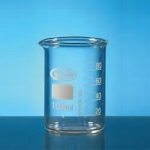Beakers are cylindrical containers, typically made of glass or plastic, used in laboratories for mixing, stirring, and holding liquids or samples.They are commonly used in chemical, biological, and clinical settings. While they can provide approximate volume measurements, beakers are not designed for precise volumetric measurements.
Key Uses of Beakers:
-
Mixing and Stirring:Beakers facilitate the combination of substances, either manually or with mechanical stirrers.
-
Holding Solutions and Samples:They serve as temporary containers for storing solutions and other samples before further analysis.
-
Heating:Beakers can be heated on Bunsen burners or in hot baths, allowing for processes like dissolving, boiling, or evaporation.
-
Small-Scale Reactions:They can be used as reaction containers for various chemical reactions.
-
Approximate Volume Measurement:Beakers often have graduations for estimating liquid volumes, although precision measurements require other instruments.
-
Catching Liquids:Beakers can be used to catch liquids from titrations or filtrates from filtering operations.
Glass Beakers complies with DIN 12331 & ISO 3819, made from Boro 3.3, large Labelling field for easy marking, uniform wall thickness, clear white graduation for easy reading, highly resistant to chemical attack. Plastic Beakers made of polypropylene, clear raised graduation for easy reading.
Volumes for Plastic:
- 25ml

- 50ml
- 100ml
- 250ml
- 500ml
- 1000ml
- 2000ml
- 5000ml
Volumes for Glass:
- 10ml

- 25ml
- 50ml
- 100ml
- 150ml
- 250ml
- 400ml
- 600ml
- 800ml
- 1000ml
- 2000ml
- 3000ml
- 5000ml
- 10000ml

